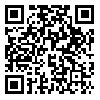BibTeX | RIS | EndNote | Medlars | ProCite | Reference Manager | RefWorks
Send citation to:
URL: http://payavard.tums.ac.ir/article-1-5587-en.html
2- Assistant Professor, Medical Laboratory Sciences Department, School of Allied Medicine, Tehran University of Medical Sciences, Tehran, Iran
3- Master of Sciences Student in Microbiology, School of Medicine, Hamadan University of Medical Sciences, Hamedan, Iran
Background and Aim: Breast cancer is the most common type of cancer among women. A subset of isoflavones such as phytoestrogens (plant estrogens) have mammalian estrogen-like properties. Alfalfa has high isoflavone content. The aim of this study was to examine the effect of alfalfa’s isoflavones on breast cancer and lipid profile in these patients.
Materials and Methods: Thirty BALB-C mice (17±2 gr weight range) were selected. The rats were divided into four groups. The first and second group triggered to breast cancer by implanting cell lines. The third and fourth groups were healthy. Alfalfa extract was prepared by vacuum distillation.
Groups I and II received extraمct of alfalfa. Groups II and IV (control) received no treatment. After 6 weeks the blood serum of all mice were prepared. Concentration of estradiol, LDL-cholesterol, HDL-cholesterol and total cholesterol were measured.
Statistical analysis was performed by t-student and Graphpad statistical software. The significance level was set at P=0.05.
Results: The level of estradiol, total cholesterol, and LDL-cholesterol decreased significantly in the first group versus the second group (P<0.00 for all). The level of HDL-cholesterol increased insignificantly in the first group when compared to the second group (P=0.09).
Conclusion: Alfalfa extract with effect on esteradiol levels and lipid profile in mice with breast cancer could be useful in improving the patient’s condition.
| Rights and permissions | |
 |
This work is licensed under a Creative Commons Attribution-NonCommercial 4.0 International License. |





